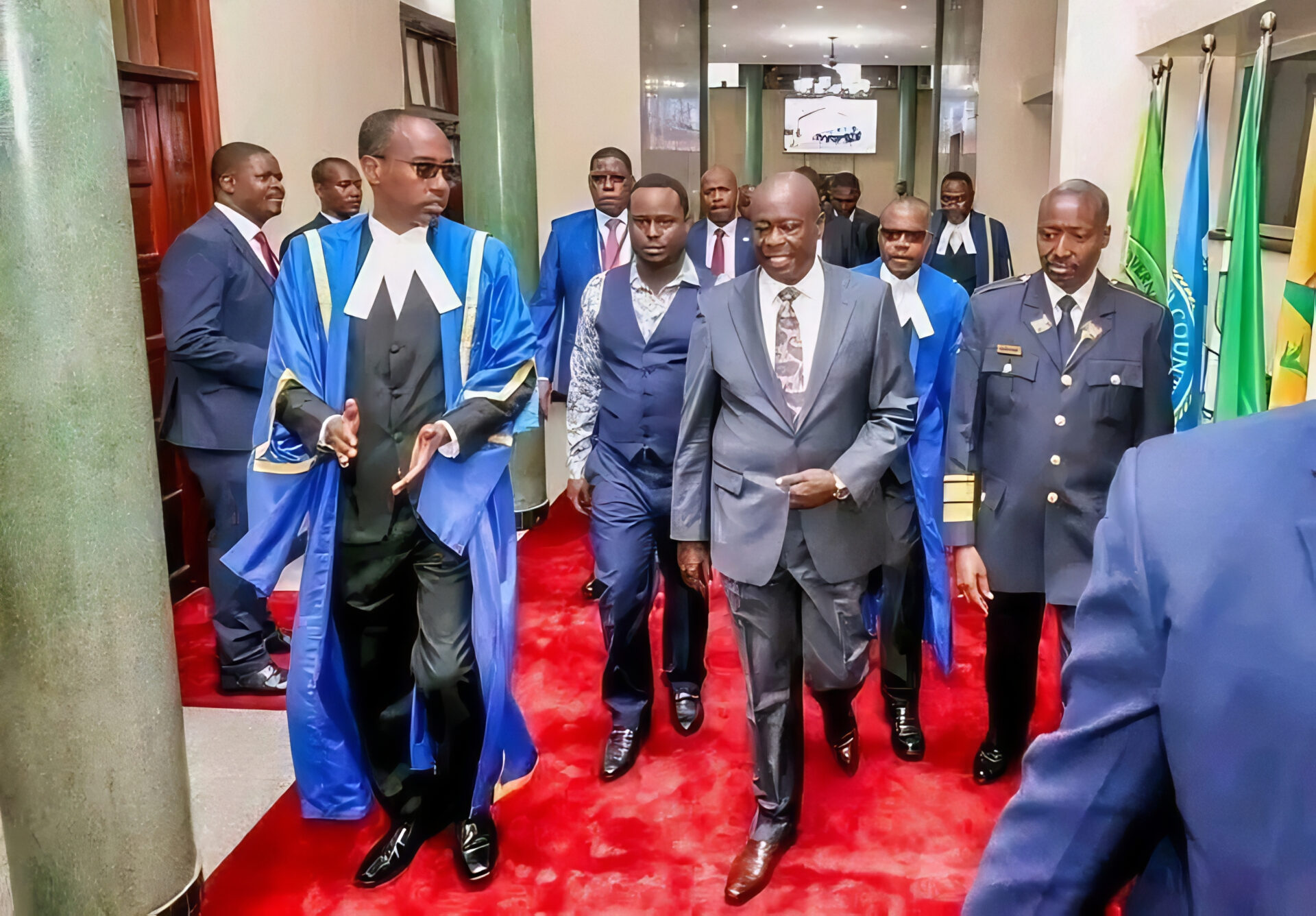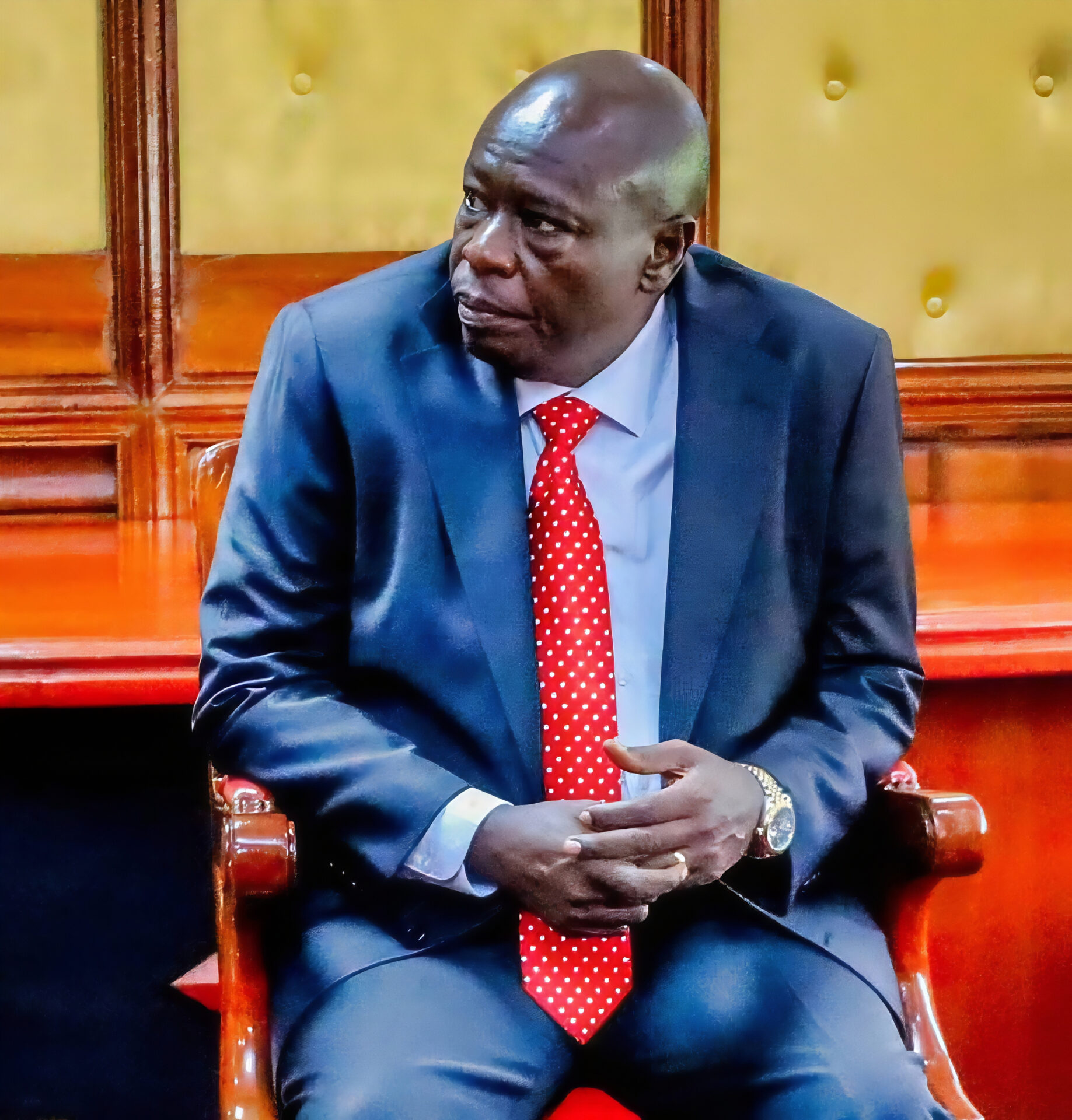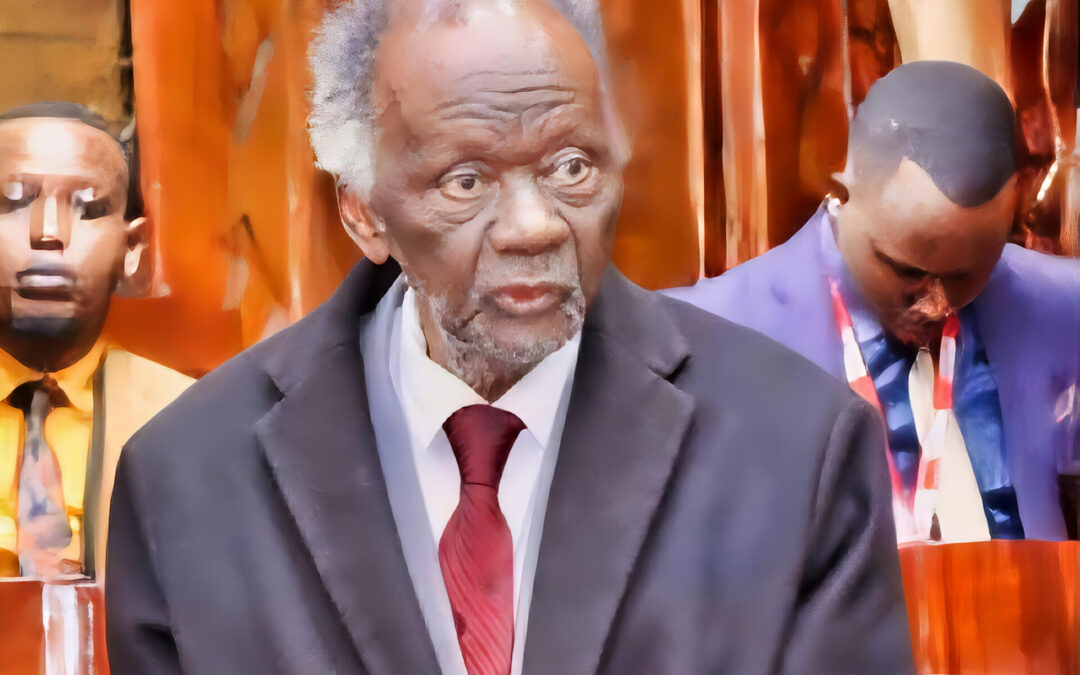Time Management in the Courtroom: John Khaminwa’s New Role
In the context of the ongoing Gachagua impeachment proceedings, renowned lawyer John Khaminwa has assumed a new role. Mr. Khaminwa, renowned for his eloquence and erudition, is now engaged in instructing both judges and lawyers on the intricacies of time management. It is worth noting that a courtroom can serve two distinct functions: that of a judicial venue and that of an educational institution.

Time is of the Essence
“Time is our most valuable asset, yet we often fail to utilise it effectively,” states William Penn. It appears that Khaminwa is striving to prevent this courtroom from falling into that trap. Given his considerable experience, he is keen to emphasise the importance of efficient time management in order to ensure the smooth running of the legal process. After all, nobody wants a case to take longer than the average duration of a popular TV drama.
A Lesson in Efficiency
In light of the pivotal impeachment proceedings, Khaminwa’s counsel is now more vital than ever. His lectures have become a highlight of the proceedings, offering valuable insights and perhaps a few moments of levity along the way. As the adage goes, “A lawyer’s time and advice are their most valuable assets.” Mr. Khaminwa appears to be offering equal measures of wisdom and humor.
The Importance of Time Management in Legal Proceedings
In the legal profession, effective time management is not just a desirable skill; it is a necessity. It is crucial to utilise time efficiently, as inefficient use of time can result in prolonged cases, increased costs and frustrated clients. John Khaminwa is acutely aware of this, and his endeavours to instil a sense of urgency and efficiency among his colleagues demonstrate the significance of this frequently overlooked aspect of legal work.
In light of the recent national attention surrounding the Gachagua impeachment case, there is an even greater need for swift and decisive action. Mr. Khaminwa’s approach is not merely about accelerating the process; it is also about ensuring that justice is served without unnecessary delays. By effectively managing time, the legal team can focus on the core issues at hand, ensuring a timely resolution of the case.
Khaminwa’s Unique Approach
John Khaminwa’s approach to time management in the courtroom is both distinctive and effective. Rather than merely instructing his colleagues to work faster, he provides them with practical tools and strategies to optimise their workflow. This includes establishing clear deadlines, prioritising tasks and minimising distractions. By adopting these techniques, judges and lawyers can enhance their productivity and ensure the Gachagua impeachment proceedings run smoothly.
Furthermore, Khaminwa’s lectures are infused with humour and anecdotes, making them not only informative but also engaging. His ability to establish rapport with his audience and present complex concepts in an accessible manner is what sets him apart as a mentor. Consequently, his sessions are well attended by both experienced professionals and those new to the field.
The Broader Implications
The insights shared by John Khaminwa have a broader impact beyond the courtroom. Effective time management is a skill that can benefit individuals in all sectors, from business executives to students. By acquiring this skill, individuals can achieve their goals more efficiently and achieve a more balanced lifestyle.

In the context of the Gachagua impeachment case, Khaminwa’s teachings serve as a reminder of the critical role that time management plays in the pursuit of justice. By prioritising efficiency, the legal team can ensure that the proceedings are conducted fairly and that all parties involved are treated with respect and dignity.
Understanding the Legal Proceedings: A Case Analysis
In today’s legal proceedings, we will examine the details of a matter that has involved multiple petitions and applications filed in the courts. This case has attracted considerable interest due to its implications for constitutional law and judicial processes. The sequence of events commenced with the submission of a series of applications via an online portal, which subsequently led to a court session convened to address a range of legal concerns.
The Background and Initial Proceedings
The genesis of this case can be traced back to the filing of three pivotal files in Kuga, numbered 13, 14, and 15 of 2024. The court issued interim conservatory orders in respect of these files. In light of these orders, further directives were issued, requesting the Honourable Chief Justice to intervene. Accordingly, the files were forwarded to the Chief Justice’s office on 18 October 2024. On the same day, the Deputy Chief Justice constituted a bench to hear these matters, resulting in the applications being filed online for today’s hearing.
The Court’s Clarification and Current Proceedings
The presiding judge provided a detailed account of the sequence of events, highlighting the procedural steps that led to the current hearing. The court reaffirmed its position on the handling of files, reiterating that only those for which directions had been explicitly provided would be considered. This clarification was pivotal in establishing the context for the deliberations and ensuring a focused discussion on the matters at hand.
Key Issues Raised During the Proceedings
One of the key topics of discussion was the alleged consolidation of certain files. There was some confusion regarding whether specific matters had been consolidated, which led to debates on the procedural accuracy of the court’s directions. The court stated that no consolidation had taken place and that each file was to be addressed individually in accordance with the issued directions.
Concerns Over Judicial Processes and Transparency
During the course of the session, concerns were raised regarding the transparency and procedural integrity of the judicial processes. The empanelment of the bench and the role of the Deputy Chief Justice in this process were the subject of questions. These concerns highlighted the necessity of compliance with constitutional obligations and the importance of ensuring that judicial actions are perceived as fair and impartial.
Legal Implications and Constitutional Considerations
The proceedings also addressed significant constitutional considerations, particularly the interpretation of Article 165 of the Constitution. This article sets out the role of the Chief Justice in appointing benches for cases involving substantial questions of law. The discussion focused on the question of whether the Deputy Chief Justice could exercise this authority in the absence of the Chief Justice. This raised questions about the scope of delegation and the division of administrative responsibilities within the judicial system.
The Role of Online Applications and E-Filing Systems
The introduction of online applications and e-filing systems was a significant factor in this case, reflecting the ongoing evolution of judicial processes. The option of filing applications online enabled the proceedings to be expedited, although it also introduced complexities in the management and prioritisation of cases. The court’s use of these systems highlighted the necessity for transparency and efficiency in the management of digital submissions.
Responses from Legal Representatives
A number of legal representatives presented their respective arguments, with each party focusing on different aspects of the case. Some parties emphasised the importance of procedural fairness and transparency, while others highlighted the urgency of addressing the conservatory orders and the implications for the parties involved. The diversity of perspectives contributed to a more comprehensive and nuanced understanding of the legal issues at hand, highlighting the multifaceted nature of legal disputes.
The Court’s Directive and Next Steps
In light of the concerns raised, the court has issued a directive requiring the parties to submit a formal application contesting the legitimacy of the bench within a specified timeframe. It is essential that this application is addressed without delay to guarantee the continuity of proceedings in an efficient manner and in accordance with legal protocols. The court’s commitment to resolving these matters demonstrates its dedication to upholding the rule of law and ensuring justice is served.
The proceedings demonstrated the inherent complexities of legal cases involving multiple petitions and constitutional questions. As the court addresses these challenges, it is committed to maintaining procedural integrity, transparency, and adherence to constitutional mandates. The results of these discussions will not only affect the parties involved but also establish significant precedents for future judicial processes in the country.
Understanding the Role of International Law in National Affairs
In today’s increasingly globalised world, the concept of international law is no longer limited to the boundaries of individual nations. It has become an essential component of how countries interact and maintain justice within their borders. This shift in perspective is particularly important when considering complex legal matters that have an impact beyond national borders.
A number of countries, including the United States, have made significant progress in integrating international law into their legal systems. This process requires extensive research and adaptation to ensure that domestic legislation is aligned with international standards. A number of proposals have been put forward by legal scholars and practitioners with a view to facilitating this integration. However, it appears that there is still room for improvement.
A Call for Legal Reform and National Revival
One key issue that requires further attention is: What is the public’s view on how international law should be applied domestically? This question is particularly pertinent in the context of national revival and healing. To illustrate, we may consider the situation in Kenya. Kenya is at a pivotal moment in its history, with a clear appetite for a new era of growth, renewal and reform in its governance and legal structures.
Kenyan lawyers have provided input on this matter, emphasising that this is part of the healing process for the entire nation. They contend that legal reform is a prerequisite for national revival. However, there is a need for a clearly defined vision and consensus on the direction the country should take. What is the optimal timeframe for implementing these reforms, and what should be the primary focus areas?
The Complex Issue of Impeachment
In the legal sector, one of the most significant challenges currently facing Kenya is the impeachment of the Deputy President. This is a matter of great consequence, with ramifications that have reached across the entire nation. The legal community and the public are debating the appropriate level of attention to be devoted to this issue, given its critical role in the healing process.
From the judicial sector, there is a call for confidence and clarity regarding the future direction. Are we making progress with the required determination, or are we trapped in a cycle of indecision and ambiguity? The role of senior counsel is of great importance in this process, as they are afforded the privilege of speaking first, even before the Attorney General. It is vital that we have the benefit of their insights and leadership as we navigate this complex legal landscape.
The Importance of Dialogue and Participation
One of the most important factors in resolving these issues is open dialogue. It is vital to provide an open forum for discussion and the expression of views on the matter. Open communication is an essential element of the healing process and is necessary for reaching a consensus on the way forward. It is imperative that legal professionals, policymakers and the public engage in meaningful discussions to address the challenges facing the nation.
Some parties contend that titles and positions are of limited consequence in effecting substantial changes. However, they do hold significance when it comes to providing guidance to the nation through challenging periods. It is vital to maintain an open mind and to give due consideration to a range of perspectives.
Moving Forward with Confidence
The future of Kenya, like that of many other nations facing similar challenges, depends on the ability to move forward with confidence. This necessitates a collective approach to addressing the pertinent issues, whether they pertain to the legal, political, or social spheres. The path to national revival is not one that can be taken lightly. It demands commitment, dialogue and a shared vision for the future.
In conclusion, the integration of international law into national affairs is a complex but essential process. It is essential to engage in careful consideration, dialogue, and collaboration with all relevant stakeholders. By addressing urgent matters such as impeachment with transparency and determination, countries like Kenya can progress with assurance and optimism for a more promising future.
As the Gachagua impeachment case progresses, the focus remains on John Khaminwa and his efforts to instill a culture of time management within the courtroom. His distinctive approach, which combines wisdom and humour, has been well received by his colleagues and has the potential to leave a lasting impact on the legal profession.
Further updates will be provided for those interested in learning more about the Gachagua impeachment case and John Khaminwa’s ongoing efforts. As the proceedings continue, it is clear that Khaminwa’s teachings will be instrumental in determining the outcome of this pivotal case.
Abbas J
- Healthcare and Land Ownership: Machakos County’s Promise of Progress - 13 November 2024
- The Ndukuma Dam Run: A New Chapter in Athletic Excellence - 10 November 2024
- Commercial Banks in Kenya: Record Fines and Regulatory Challenges - 9 November 2024
